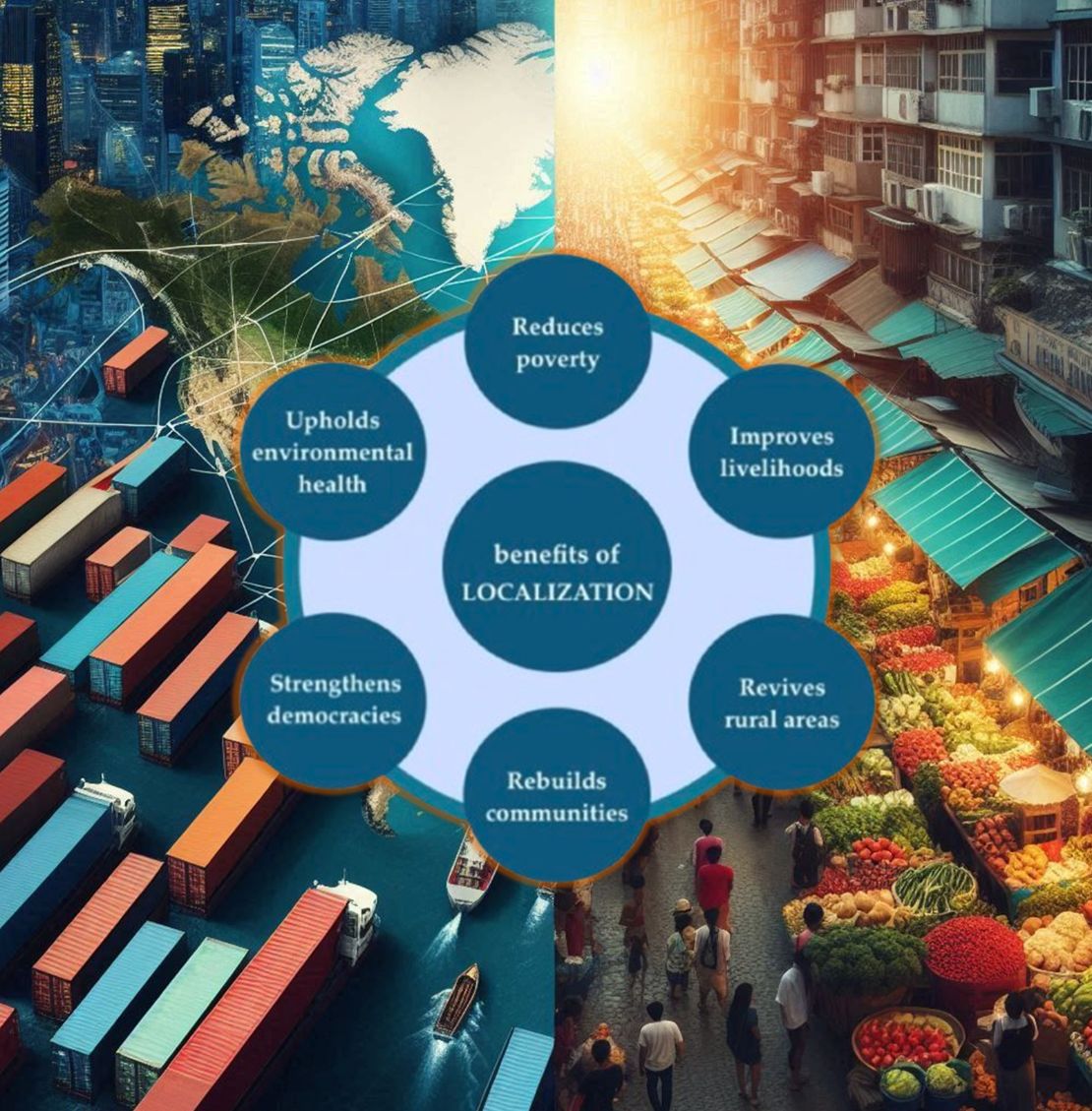As business leaders and policymakers, we stand at the precipice of a paradigm shift. For decades, globalization has been the North Star guiding economic progress, innovation, and prosperity. We've witnessed supply chains stretch across continents, economies intertwine at unprecedented scales, and markets expand far beyond national borders. But as we hurtle forward, the hidden costs of this system—environmental degradation, social fragmentation, and widening economic disparities—have become impossible to ignore. The time has come for a critical reevaluation of our approach.
What if the future of economic prosperity lies not in expanding outward, but in turning inward? Localization—the strategic shift of economic activity to smaller, community-based systems—may offer the sustainable, resilient alternative that both business and political leaders urgently need. This article delves into the untapped potential of local economies, illuminating how a pivot towards the local could provide a blueprint for addressing some of the most pressing challenges of our time.
The Mirage of Global Efficiency
Globalization has undeniably fueled unprecedented growth, but at what cost? The relentless pursuit of efficiency and scale has led to startling contradictions in our economic system. Consider the paradox of global trade: countries like the UK simultaneously export and import identical products such as butter, unnecessarily inflating carbon emissions and introducing inefficiencies. Similarly, the United States engages in the puzzling practice of exporting and importing billions of pounds of beef annually. These "trade loops" are symptomatic of the deeper absurdities embedded in global supply chains—an intricate web of transactions that often prioritize corporate interests over community well-being.
While these systems may maximize short-term profitability, they expose us to significant vulnerabilities. Recent global disruptions, such as the COVID-19 pandemic and subsequent supply chain shocks, have laid bare the fragility of these interconnected systems. As stewards of business and governance, we must ask ourselves: Is this the model we want to perpetuate? More crucially, is it sustainable in the face of mounting global challenges?
Localization: Forging Resilience and Sustainability
In contrast to globalization's sprawling complexity, localized economies offer a framework built on resilience, community engagement, and sustainability. Localization isn't about isolationism; it's about creating stronger, more self-sufficient systems that can thrive within their own ecosystems while remaining connected to the global community. It's about empowering local businesses, reconnecting production with consumption, and fostering economic models that are better equipped to weather global storms.
For businesses, the localization movement presents an opportunity to reimagine procurement and supply chains. By sourcing goods and services locally, companies can significantly reduce their carbon footprint while building stronger, more transparent relationships with suppliers and communities. Local supply chains are inherently more agile and responsive to local needs, making them less susceptible to global disruptions. Moreover, local sourcing fosters trust and supports community well-being—a critical factor as consumers become increasingly conscious of the ethical implications of their purchasing decisions.
For political leaders, this shift represents a chance to rebuild economies from the ground up. Localization policies can prioritize community-driven economic activity, bolster small and medium-sized enterprises (SMEs), and invest in local infrastructure such as food markets, renewable energy projects, and public transportation networks. These initiatives not only strengthen local economies but also create jobs and reduce income inequality by promoting more inclusive economic growth.
Beyond GDP: Redefining Economic Success
One of the primary obstacles to rethinking our economic systems is the entrenched focus on Gross Domestic Product (GDP) as the ultimate measure of success. However, GDP as a metric overlooks the social and environmental costs of economic activity. It lauds growth for growth's sake, even when that growth stems from activities that degrade the environment or compromise public health.
Under the GDP paradigm, treating illnesses caused by pollution contributes to economic growth, while efforts to prevent those same diseases—such as promoting local, sustainable farming—often remain invisible in national accounting. This isn't merely an academic concern; it reflects a distorted set of incentives that prioritize short-term profit over long-term societal and environmental well-being.
As we reimagine our economic systems, it's crucial to adopt more comprehensive metrics—ones that capture well-being, environmental health, and social equity. Several alternative frameworks are already in use, from Bhutan's Gross National Happiness (GNH) to the Genuine Progress Indicator (GPI), which adjusts GDP by accounting for environmental degradation, income inequality, and the value of non-market labor like caregiving. These models offer a roadmap for measuring what truly matters in society and provide business and political leaders with the tools to track progress toward more sustainable outcomes.
Local Food Systems: The Bedrock of a Localized Economy
One area where the benefits of localization are particularly evident is in food production. Global food systems are among the largest contributors to environmental destruction, responsible for significant deforestation, water pollution, and carbon emissions. They also create an unsustainable reliance on long, carbon-intensive supply chains, which, as the pandemic demonstrated, are fragile and easily disrupted.
Localization offers a compelling alternative by encouraging communities to grow and consume food locally. The benefits of this approach are twofold: it reduces environmental impacts while simultaneously supporting local economies. Businesses and governments can play a pivotal role in this transition by prioritizing local sourcing in their procurement practices, investing in community-supported agriculture (CSA), and creating public policies that make it easier for local farmers to thrive.
In doing so, leaders not only support environmental sustainability but also address the growing consumer demand for transparency and ethical production. Consumers increasingly want to know where their food comes from and how it was produced. By aligning with this trend, businesses can build trust and loyalty, while governments can foster food security and community resilience.
Resilience Over Efficiency: Building a Stronger Economic Model
For years, businesses have been laser-focused on efficiency—producing goods faster, cheaper, and at a larger scale. But efficiency, while important, is not enough. As recent global events have shown, efficiency alone cannot ensure resilience. In fact, the very systems designed to maximize efficiency are often the most vulnerable to shocks.
Resilience, on the other hand, is about creating systems that can adapt to change, withstand disruptions, and continue to function in the face of challenges. This is where localization truly shines. By decentralizing production and distribution, businesses can reduce their dependence on global supply chains and create more adaptable, flexible systems. This resilience extends beyond economic considerations—localized systems also strengthen social bonds and community ties, creating a more cohesive, connected society.
For policymakers, the shift toward resilience means rethinking how public resources are allocated. Instead of investing heavily in infrastructure that facilitates global trade—such as mega-ports and expansive airports—governments should prioritize investments that support local economies. This could include renewable energy projects, local transportation networks, or initiatives that bolster community-level economic activity.
The Road Ahead: Embracing Local Futures
The future of business and politics stands at a critical juncture. We can continue down the well-worn path of globalization, with all its associated risks and inequities, or we can chart a new course—one that values sustainability, community, and resilience. Localization offers a practical, scalable alternative that aligns with the growing global awareness of climate change, social responsibility, and the need for more ethical business practices.
For business leaders, this means making a commitment to local sourcing, forging deeper relationships with community stakeholders, and rethinking how success is measured and achieved. It requires a fundamental shift in corporate strategy, moving away from a singular focus on shareholder value to a more holistic approach that considers the well-being of all stakeholders, including employees, local communities, and the environment.
For political leaders, embracing localization means supporting policies that strengthen local economies and create conditions where community-driven initiatives can thrive. This could involve tax incentives for businesses that prioritize local sourcing, investment in education and training programs that support local industries, and the development of regulatory frameworks that favor small, local businesses over multinational corporations.
As we navigate an uncertain future, one thing is clear: localization is not just a passing trend or a feel-good initiative. It's a robust strategy for building a more sustainable, equitable, and resilient world. The question is not whether we should embrace it, but how quickly and effectively we can make the transition.
The path forward will not be without challenges. Shifting away from entrenched global systems will require courage, innovation, and a willingness to challenge the status quo. But the potential rewards—a more stable economy, a healthier environment, and stronger communities—far outweigh the difficulties of transition.
As business and political leaders, we have the power to shape this future. By embracing localization, we can create a world where economic prosperity goes hand in hand with social and environmental well-being. The time for change is now. Are we ready to lead the way?








 .
.